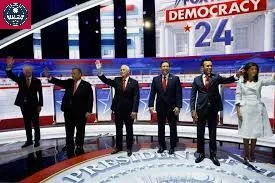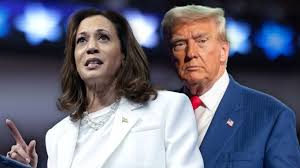The first 2024 Republican presidential debate marked a significant moment in the race, with former President Donald Trump notably absent. Eight of his primary rivals took the stage, engaging in lively discussions and exchanges. Vivek Ramaswamy, a newcomer to politics, emerged as a central figure, defending Trump’s stance in his absence. With candidates jockeying for attention and positioning, the debate provided valuable insights into the Republican landscape and the strategies employed by various contenders.
Ramaswamy’s Unexpected Spotlight
Vivek Ramaswamy, a 38-year-old entrepreneur and first-time candidate, took center stage during the debate. Despite his newcomer status, Ramaswamy engaged in multiple heated exchanges. Former Vice President Mike Pence questioned Ramaswamy’s understanding of presidential responsibilities, setting off a lively back-and-forth. Additionally, former New Jersey Gov. Chris Christie likened Ramaswamy’s answers to those generated by AI, challenging his credibility. The unexpected focus on Ramaswamy reflected his rising popularity in recent polls and the attempts by other candidates to curtail his momentum.

DeSantis’ Surprising Performance
Florida Gov. Ron DeSantis, a prominent candidate in the race, did not command the spotlight as anticipated. Despite suggestions that rivals would target him, DeSantis avoided intense attacks. He strategically balanced his performance, not jeopardizing his second-place position in the polls. DeSantis relied on familiar campaign lines, discussing the decline of the country and the need to return Joe Biden to “his basement.” While he aimed to present himself as a strong contender, DeSantis’ performance indicated that he remains closely aligned with other candidates rather than distinctly separate from them.
Christie’s Failed Attack on Ramaswamy
Former New Jersey Gov. Chris Christie attempted to replicate his past debate success by challenging Ramaswamy’s authenticity. However, the attempt fell short, as Ramaswamy adeptly defended himself. When Christie accused him of basing his campaign on “vengeance and grievance,” Ramaswamy turned the tables, pointing out Christie’s own campaign motivations. The exchange showcased Ramaswamy’s ability to counter attacks and revealed the challenges candidates face when attempting to undermine opponents with different political backgrounds.

Differing Stances on Abortion
The Republican candidates displayed a spectrum of views on abortion, revealing the complex nature of this issue within the party. Some supported a 15-week federal abortion ban, while others resisted efforts to pass a nationwide ban due to political realities. Candidates who had signed six-week abortion bans into law at the state level refrained from explicitly endorsing a federal ban. This diversity of opinions underscores the ongoing struggle to find a unified stance on abortion that appeals to both the base and a broader electorate.


Haley’s General-Election Oriented Approach
Former South Carolina Gov. Nikki Haley took a distinctive approach aimed at the general election rather than just the Republican base. She acknowledged climate change, criticized Trump’s spending, and emphasized the need for consensus on divisive issues like abortion. Haley’s willingness to criticize Trump by name and her recognition of the need for a more moderate tone demonstrated her commitment to broadening her appeal. However, the challenge remains whether her strategy will resonate sufficiently with the Republican primary voters.
Scott’s Kindness Strategy
Senator Tim Scott approached the debate with a “kill ’em with kindness” attitude. While this approach showcased his authentic self, it resulted in limited engagement during the debate’s more intense exchanges. Scott’s focus on kindness and positivity set him apart, but it remains to be seen whether this strategy will effectively differentiate him in a field where vigorous exchanges are common. His commitment to finishing Trump’s border wall struck a chord, though the audience response demonstrated the complexity of issues even within the Republican base.
Conclusion
The first 2024 Republican presidential primary debate provided a glimpse into the strategies, dynamics, and challenges within the party’s candidate pool. With Trump absent, candidates vied for attention and showcased their policy positions. Vivek Ramaswamy’s unexpected prominence, DeSantis’ cautious approach, and the diverse stances on issues like abortion and climate change highlighted the party’s complexity. As the race continues, candidates will need to navigate these intricacies to gain support both within the primary base and for the broader general election.
FAQs of First Republican Presidential Debate
1. Why was Donald Trump absent from the debate?
Donald Trump’s absence from the debate was a notable aspect of the event. Despite not being present, his influence and policies were central to many discussions, with candidates like Vivek Ramaswamy positioning themselves as defenders of his legacy.
2. How did Vivek Ramaswamy perform in the debate?
Vivek Ramaswamy, a newcomer to politics, emerged as a central figure during the debate. He engaged in heated exchanges with other candidates, defending Trump’s positions and challenging his opponents effectively.
3. What was Ron DeSantis’ strategy during the debate?
Ron DeSantis, a prominent candidate, opted for a cautious approach during the debate. He aimed to maintain his second-place standing in the polls and focused on presenting himself as a strong contender without risking controversy.
4. How did Nikki Haley’s approach differ from other candidates?
Nikki Haley adopted a strategy geared toward the general election rather than just appealing to the Republican base. She acknowledged climate change, criticized Trump’s spending, and emphasized the need for consensus on divisive issues.
5. What were the key takeaways from the debate?
The debate highlighted the rise of newcomers like Vivek Ramaswamy, the diverse views on issues like abortion within the party, and the challenge of differentiating oneself in a competitive field. The absence of Trump also played a significant role in shaping the discussions.





[…] Vivek Ramaswamy, a name that has resonated both in the biotech industry and the political arena, is a figure known for his brashness and audacious endeavors. While his recent appearance on the Republican debate stage garnered attention, his journey into biotech was marked by similar boldness. From challenging the pharmaceutical giants to his role in pioneering a new business model, Ramaswamy’s story is one of ambition, innovation, and the pursuit of transformation. […]